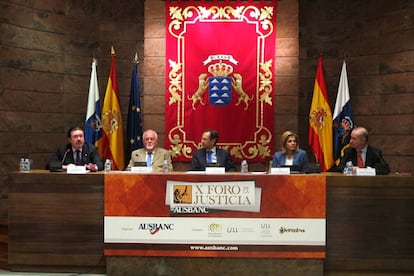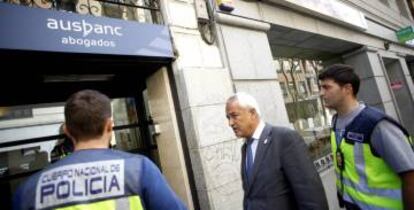Spanish judges divided over Ausbanc fees-for-speeches scandal
Calls for a tougher ethics code heard amid concern about the damage to magistrates' reputation

Some within Spain's judiciary have reacted with disbelief to news that a number of judges have been paid as guest speakers at legal conferences organized by Ausbanc, the consumer-rights group whose president has been arrested on extortion charges.
Sources consulted by EL PAÍS – which broke the story on Thursday – said even though the practice is legal, it is important to choose speaking engagements carefully so as to avoid damaging judges’ public image of impartiality.
The General Council of the Judiciary, the legal profession’s watchdog, said that judges are not barred from participating in conferences.
Political parties react
Parties have asked the CGPJ to investigate whether judges who participated in Ausbanc events compromised their own impartiality.
“The Council, if it feels it is warranted, should analyze what’s happened. Let us hope that all checks worked,” said Pedro Saura, the Socialist spokesman for economic affairs.
José Manuel Villegas, the deputy secretary of Ciudadanos, said “there should be a stricter regulation of judges’ activities to avoid situations that are, to say the least, not very esthetic.”
On Thursday, EL PAÍS revealed that judges and prosecutors all over Spain have been participating since 2010 in conferences organized by Ausbanc, a financial consumer rights association led by Luis Pineda, a controversial figure with ties to the political far right.
On Friday of last week, Pineda was arrested on suspicion that he had been threatening lenders and individuals with negative media campaigns if they didn’t take out expensive ads in his own publications.
Guest speakers at Ausbanc events were paid between €800 and €1,500 for lectures on a variety of legal topics.
The CGPJ said that judges are barred from holding another paying position, except in academia or legal research, but they may also participate in the creation of literary, scientific, artistic and technical works.
It adds that the presence of magistrates in “forums, courses or public events along with other actors of the judiciary contributes to the out-of-court debate on issues that affect all of society.”
Sign up for our newsletter!
EL PAÍS English Edition is launching a weekly newsletter. Sign up today to receive a selection of our best stories in your inbox every Saturday morning. For full details about how to subscribe, click here.
Legal associations largely supported this view, albeit with some caveats.
Celso Rodríguez Padrón, spokesman for the conservative Asociación Profesional de la Magistratura (APM), the largest body representing the country's judges, said participating in events is legal, but added: “what these isolated cases show is that, based on an elementary sense of prudence, we should be rigorous in choosing the institutions or bodies we are going to collaborate with at the educational level.”
Joaquín Bosch, spokesman for the progressive Jueces para la Democracia (Judges for Democracy), went a step further.
“Our starting point is that the judges who attended these forums did nothing wrong or immoral: they went there without knowing the information that has now emerged,” he said. “Yet we should analyze whether participating in these sorts of educational activities could affect the principle of impartiality arising from questions of whether the judge could benefit the individual who is paying the fee.”

Nearly every judge and prosecutor consulted for this story agreed that in the case of private bodies such as Ausbanc, they should be particularly vigilant.
“I wouldn’t go, because a day could come when I am involved in litigation with them and that would create a problem,” said Raimundo Prado, spokesman of the Francisco de Vitoria Association.
“This causes tremendous damage to everyone,” said a criminal judge who declined a speaking invitation from Ausbanc two years ago. “Because of 15 magistrates, the image is that judges fraternize with corrupt individuals.”
But Prado also said that “perhaps we should wonder why judges give lectures, prepare students for public examinations and act as guest speakers at events. Maybe it’s that they are not getting paid according to their training and responsibilities.”
Salvador Viada, spokesman for the Professional and Independent Prosecutors' Association, went a step further. “What’s required is an ethics code,” he said. Members of the judiciary should not accept fees, nor should they accept tickets to soccer games or bullfights.”
His association has demanded the implementation of such a code from the Attorney General’s Office, which has yet to broach the subject.
English version by Susana Urra.
Tu suscripción se está usando en otro dispositivo
¿Quieres añadir otro usuario a tu suscripción?
Si continúas leyendo en este dispositivo, no se podrá leer en el otro.
FlechaTu suscripción se está usando en otro dispositivo y solo puedes acceder a EL PAÍS desde un dispositivo a la vez.
Si quieres compartir tu cuenta, cambia tu suscripción a la modalidad Premium, así podrás añadir otro usuario. Cada uno accederá con su propia cuenta de email, lo que os permitirá personalizar vuestra experiencia en EL PAÍS.
¿Tienes una suscripción de empresa? Accede aquí para contratar más cuentas.
En el caso de no saber quién está usando tu cuenta, te recomendamos cambiar tu contraseña aquí.
Si decides continuar compartiendo tu cuenta, este mensaje se mostrará en tu dispositivo y en el de la otra persona que está usando tu cuenta de forma indefinida, afectando a tu experiencia de lectura. Puedes consultar aquí los términos y condiciones de la suscripción digital.








































